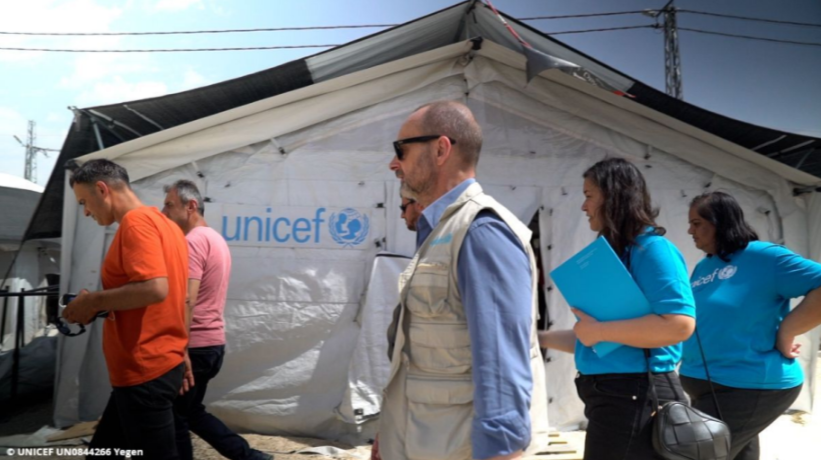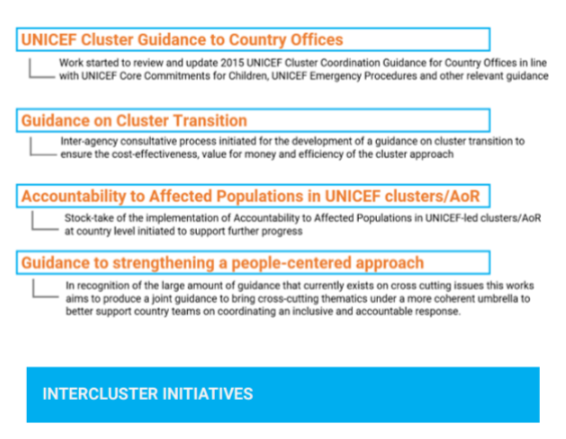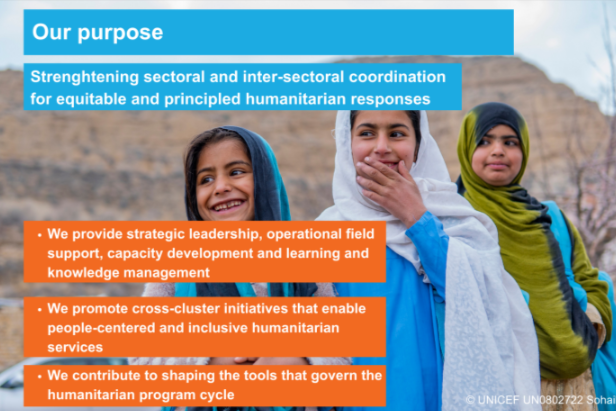IN BRIEF INTERCLUSTER INITIATIVES VOICES FROM THE FIELD NEWS FEATURE LEARNING
Welcome back to the GCCS quarterly newsletter. With this edition, we inaugurate a new section with a conversation about the Türkiye and Syria earthquake response coordination efforts and where we hope to bring you more reflections from the field. The newsletter also includes information about how to strengthen a people-centered approach in humanitarian action, a recap of 5+ years of support to UNICEF-led global clusters on cash transfers, an update on initiatives recently started in line with the recommendations to the second Evaluation of UNICEF roles as cluster lead (co-lead) agency and other news that we hope will be of your interest.
We hope you enjoy reading it!
The GCCS Team
IN BRIEF
Manuel Fontaine reflection on coordination
During his recent visit to Türkiye and north-west Syria to meet communities affected by the earthquakes that hit the region early this year, Manuel Fontaine, Director of EMOPS, highlighted the importance of coordination work as the most important contribution to ensure all efforts carry the best support to people.
Watch his remarks in the link below.
Watch the video

CLARE II update: recently initiated think pieces
GCCS continues to play a leading role in the implementation of the recommendations from the second evaluation of UNICEF’s role as cluster lead (co-lead) agency. There is a set of recommendations calling for UNICEF to do more in showing the way of certain policy and guidance themes. In May and June, we launched multiple consultancy exercises to implement the following:

Strengthening a people-centered approach in the Humanitarian Programme Cycle
In response to the increasing complexity of humanitarian response and calls for a lightening of Humanitarian Programme Cycle (HPC) processes, the UNICEF Global Cluster Coordination Section (GCCS) is undertaking efforts to better align integration of various cross-cutting thematics under a broader, coherent people-centered approach.
In2022, the GCCS commissioned a comprehensive review of Humanitarian Needs Overviews (HNOs) and Humanitarian Response Plans (HRPs) to assess the extent to which people-centered approaches are reflected in HNOs and HRPs. A report of this review process is available here. We thank the consultant Mireia Cano for her work in the report.
Key recommendations include:
- Strengthen the linkage between HNO and HRP with regard to intersectional analysis and a people-centered approach.
- Demonstrate the impact of implementing a people-centered approach, through strengthened monitoring and documentation of good practices and their results.
- Further strengthen reflection of localization in HNOs/HRPs, including to often excluded local actors, such as women-led organizations and organizations of
persons with disabilities. - Further strengthen collection of data, including through disaggregation of needs assessment and monitoring data by sex, age and disability
- Systematically consider how a people-centered approach is reflected in projects design, implementation and monitoring.
Convening collective reflection on advancing people-centered approaches
As part of the Humanitarian Networks and Partnership Week (HNPW) in April, the GCCS organized a session on integrating cross cutting issues in the HPC, as a space for interagency sharing of experience and learning on a people-centered approach in the HPC.
During the session, key questions were discussed such as:
- How to balance ‘consolidation’ of cross cutting issues with the need to maintain dedicated attention to each?
- What is needed to advance a people centered approach at country and at global levels?
- How is a people-centered approach applied in specific sectors and specific contexts?
The event included panelists from OCHA, Impact Initiatives/ REACH, IOM, UNHCR and the Inclusion Task Force in Yemen. A recording of the event is available here.
VOICES FROM THE FIELD
Türkiye/Syria: A conversation about coordination with GCCS colleagues on surge
Three months after the catastrophic earthquakes that struck Türkiye and north-west Syria, we spoke with colleagues from the global clusters. They shared their experience in supporting the scale-up of the response to the earthquakes in the two countries, while recognizing the courage of colleagues who, despite being personally affected by the earthquakes, stepped up to the challenge and led the coordination efforts bringing hope to the millions of people affected.
Read the full story here.
NEWS FEATURE
5+ years of NORCAP deployment supporting UNICEF-led global clusters on cash transfers
Since 2018, UNICEF-led global clusters and area of responsibility have worked to increase the use and coordination of cash transfers, in line with Grand Bargain commitments. This key workstream has been implemented in partnership with NORCAP with a deployment that resulted in the development of evidence, guidance and training materials, and in technical support to country clusters.
Key achievements include: a Global Education Cluster Synthesis Report and Guidelines on Cash and Voucher Assistance for Education in Emergencies, a Global Nutrition Cluster Evidence and Guidance Note on the Use of Cash and Voucher Assistance for Nutrition Outcomes in Emergencies, and a Global WASH Cluster Evidence Building Study for Cash and Markets for WASH in Emergencies and Market-based Programming in WASH Technical Guidance for Humanitarian Practitioners. Their findings and recommendations were distilled in a Cash and Voucher Assistance in Humanitarian Coordination online training course, which was completed by more than 175 learners in the one year since it has been launched.
Country clusters in education, nutrition, WASH and in the child protection area of responsibility have received technical support on integrating cash transfers, directly from the GCCS or through partnerships with NORCAP and the Swiss Agency for Development and Cooperation. The need for field support has grown in the past few years, in line with the growth of this humanitarian assistance modality and providing it with the current limited resources has been a challenge. With the NORCAP support to GCCS ending in June 2023, other approaches would need to be explored for UNICEF to continue this workstream.
LEARNING
#SKILLUPANDSTANDOUT
With almost 13,000 enrolments in the last year and more than 5,000 completion certificates delivered, the Humanitarian Coordination eLearning channel continues to bridge skill gaps and train staff and partners all around the globe. With consistently new and improved content available in English, French and Spanish, this is your go-to platform to skill up as a professional. Knowledge on emergency and cluster work is highly valued in UNICEF and can open opportunites for new experiences. REMEMBER as a UNICEF staff member five per cent of your time can be officially dedicated to training! So, enroll today and boost your career!

For additional information on the work of each cluster/area of responsibility please click on the images below.
We would welcome your feedback on our newsletter!
Please share your thoughts with us.
If you encounter any issues while opening links, please contact us
Copyright © Global Cluster Coordination Section, All rights reserved.